5 Health-Boosting Herbs You Can Grow in Your Kitchen
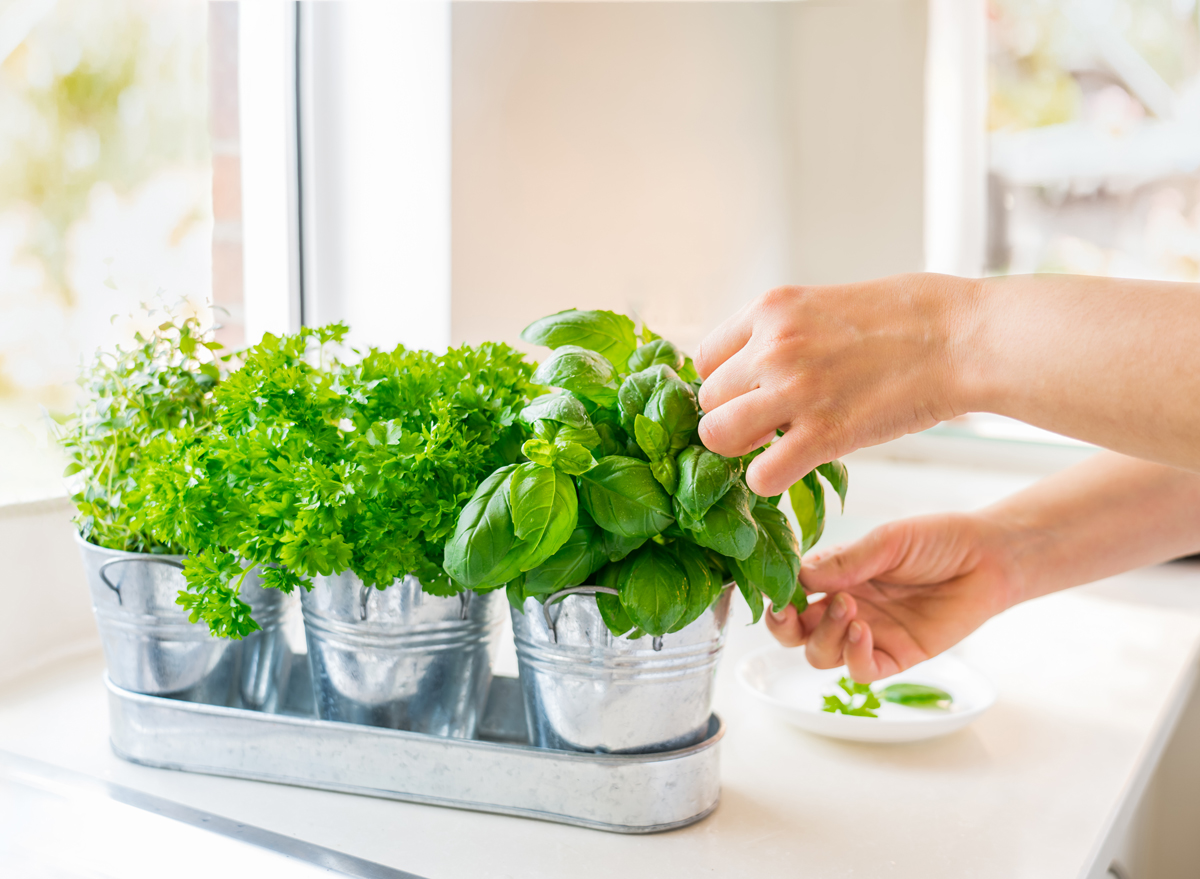
Dried herbs from your spice rack are nice in a pinch but think about how much cooler it would be to pick fresh herbs right from a sunny windowsill to brighten your meals as they brighten your kitchen. Many of the herbs you rely on regularly can grow like grass indoors with a little lovin'.
Fresh parsley, cilantro, chives, and other herbs contain good amounts of antioxidants and other nutritious compounds that will benefit your health while flavoring your vegetable dishes, soups, and roasts, says registered dietitian Lisa Hugh, DHA, RD, a doctor of health administration with a nutrition practice in Maryland.
Bonus benefit: Growing kitchen herbs may inspire you to dig into gardening in the spring. "Grow something you love to eat; start by planting something easy, like herbs," says "Farmer D" Daron Joffe, a nationally known biodynamic farmer, educator, and author of Citizen Farmers: The Biodynamic Way to Grow Healthy Food, Build Thriving Communities, and Give Back to the Earth. "Herbs grow virtually any time of year and are low maintenance."
Here's the dirt on five herbs you should seed right now for their incredible flavor and health benefits. Read on, and for more, don't miss 10 Cooking Secrets That Only Italian Chefs Know.
Basil
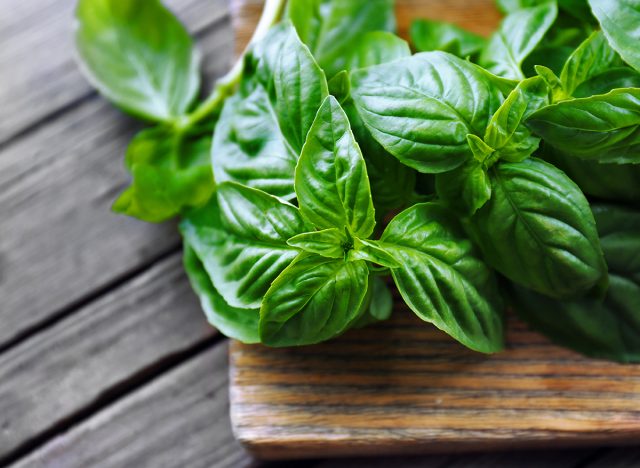
The fragrant star of a Caprese salad or sandwich and the leading lady of pesto, basil, is easy to grow. If you get more than you can use, store it by freezing it; it'll retain its flavor and nutrients.
Basil appears to be good for metabolic disorders and more. Studies suggest that eating basil leaves may help control cholesterol levels, blood pressure, and blood sugar and strengthen the immune system, according to a report in Nutrition Today.
RELATED: This Popular Herb Could Help Prevent Alzheimer's, New Study Finds
Oregano
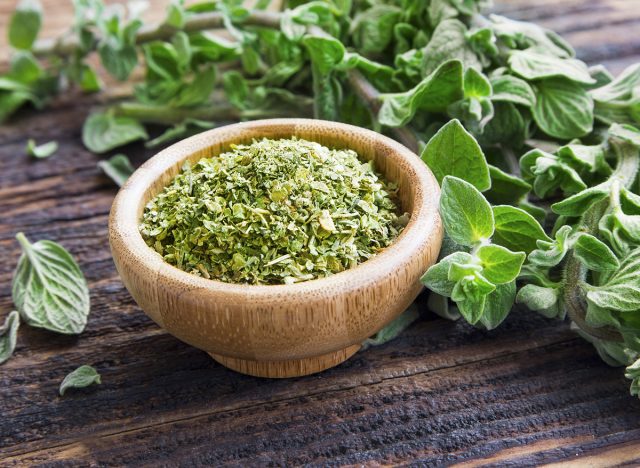
Fresh, peppery oregano leaves are terrific on grilled chicken, fish, and pork, or flicked onto a Greek salad. Toss a whole sprig of oregano into a cast-iron fry pan when cooking chicken thighs; the flavor will infuse the fat and meat.
The component of oregano with the greatest potential health benefit is carvacrol, a natural phenol with antioxidant power. In one Journal of International Medical Research study, a small group of participants was asked to take oregano oil with every meal while following nutrition advice. Those who consumed the oil showed a greater improvement in their cholesterol profiles than those who did not take the oregano.
The herb may also have anticancer properties. While human trials have not been performed, animal studies published in Phytotherapy Research suggest carvacrol in oregano may someday prove useful against breast, liver, and lung carcinomas.
Parsley
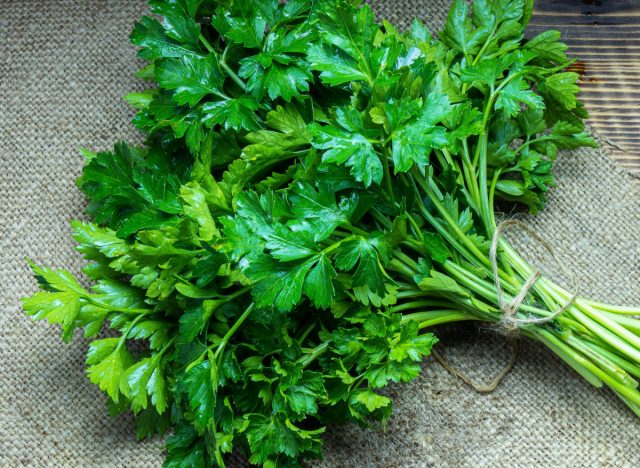
Parsley, the aromatic vegetable favorite of Eastern Europeans and a staple of the Mediterranean diet, is a powerful natural diuretic. As such, it has been shown in studies to be an effective antihypertensive—meaning it can lower your blood pressure by removing water from your bloodstream and widening blood vessels.
Also, the leafy green herb is one of the best sources of vitamin K, a fat-soluble vitamin that's important for blood coagulation and bone regeneration. A recent meta-analysis in the journal Medicine suggests that getting enough vitamin K may protect you against bone fractures.
Rosemary
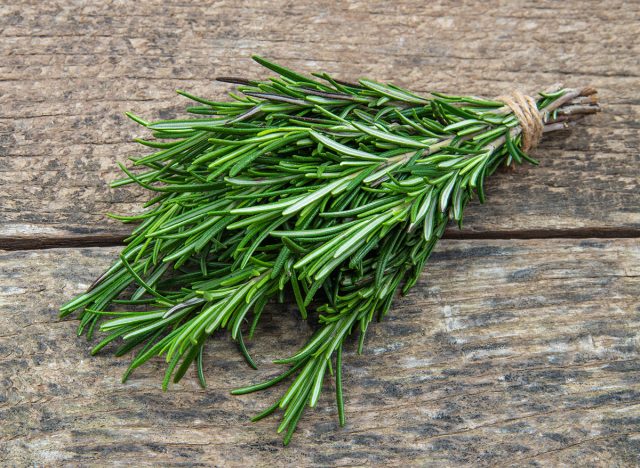
If you've cooked a rack of lamb, roasted a turkey or root vegetables, or maybe spruced up a classic gin and tonic cocktail with a sprig, you're familiar with the sturdy, woodsy, evergreen-like herb. It's so useful for cooking, you'll want to master growing it in your home.
Fragrant rosemary, which has been used for spiritual and medicinal purposes for centuries, contains good amounts of essential vitamins like A, C, and B-6, and other antioxidants, plus minerals like iron and calcium. An anti-inflammatory, rosemary is believed to be beneficial to the immune and circulatory systems. Its aroma has been shown to stimulate alertness, memory, and cognition, and improve mood.
The key bioactive in rosemary is rosmarinic acid, which is also found in basil, sage, thyme, and peppermint. Scientists in Poland explored the epigenetic effects of rosmarinic acid and found it to be chemoprotective by preventing the blocking of genes that suppress tumors in human breast cancer cells.
Thyme
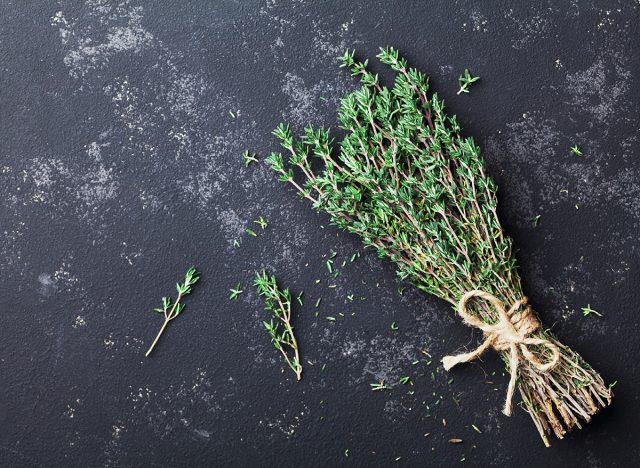
Your grandmother's mother probably dabbed thyme oil on her daughter's skinned knees. Thyme has been prized for its anti-fungal and anti-bacterial properties for hundreds of years. In fact, you've most likely used it medicinally without even knowing it if you've gargled with mouthwash or rubbed Vicks VapoRub on your chest during your last bout with the rhinovirus.
Thyme is ideal for braising short ribs and chicken, sautéing or roasting vegetables, and flavoring eggs, pasta, potatoes, and seafood. Thyme's minty, slightly lemony taste brings out the flavors of the foods much the way salt does, which is why the American Heart Association recommends using thyme (and other herbs) as a substitute for salt in cooking to help manage blood pressure. Naturopaths often use tea brewed with thyme as a cough and sore throat remedy due to its anti-inflammatory properties.
While studies have not been done in humans, research in hypertensive rats has shown that thyme significantly reduces blood pressure. Other studies suggest thyme may boost HDL (good) cholesterol while reducing LDL (bad) cholesterol and triglycerides. Finally, like most herbs, thyme is rich in vitamins and minerals like vitamins C, A, B-6; calcium; iron; magnesium; and manganese, which support a healthy immune system.








